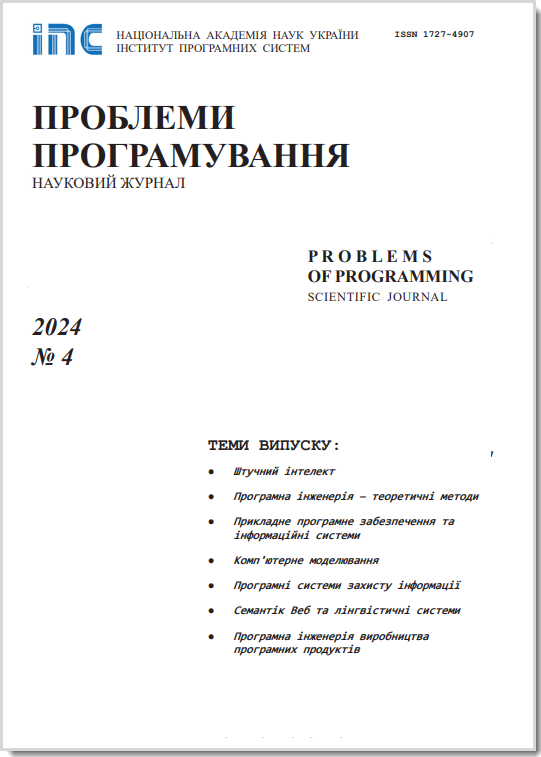On decompilation of VLIW executable files
Abstract
Keywords
Full Text:
PDF (Українська)References
Ďurfina L., Křoustek J., Zemek P., and Ká-bele B. Detection and recovery of functions and their arguments in a retargetable decompiler // In 19-th Working Conference on Reverse Engineering (WCRE’12), (King-ston, ON, CA). IEEE Computer Society, 2012. – P. 51–60.
Eilam E. Reversing: Secrets of Reverse En-gineering. Wiley, 2005.
Ďurfina L., Křoustek J., and Zemek P. Ge-neric source code migration using decompi-lation // In 10-th Annual Industrial Simulation Conference (ISC’2012). EUROSIS, 2012. – P. 38–42.
Fisher J.A., Faraboschi P., and Young C. Embedded Computing a VLIW Approach to Architecture, Compilers and Tools. – San Francisco, US-CA: Morgan Kaufmann Pub-lishers, 2005.
Křoustek J., Židek S., Kolář D., and Meduna A. Exploitation of Scattered Context Gram-mars to Model VLIW Instruction Constraints // In 12-th Biennial Baltic Electron-ics Conference (BEC’10). IEEE Computer Society, 2010. – P. 165–168.
Faraboschi P., Brown G., Fisher J.A., Des-oll G. and Homewood F. Lx: A Technology Platform for Customizable VLIW Embed-ded Processing // In 27-th International Symposium on Computer Architecture (IS-CA’00), (New York, US-NY). IEEE Com-puter Society, 2000. – P. 203–213.
The LLVM Compiler Infrastructure. http://llvm.org/, 2013.
Křoustek J. and Kolář D. Preprocessing of binary executables towards retargetable decompilation // In 8-th International Mul-ti-Conference on Computing in the Global Information Technology (ICCGI’13), (Nice, FR). International Academy, Research, and Industry Association (IARIA), 2013. – P. 259–264.
Křoustek J., Matula P., and Ďurfina L. Ge-neric plugin-based convertor of executable formats and its usage in retargetable decompilation // In 6-th International Scien-tific and Technical Conference (CSIT’11). Ministry of Education, Science, Youth and Sports of Ukraine, Lviv Polytechnic Na-tional University, Institute of Computer Science and Information Technologies, 2011. – P. 127–130.
Ďurfina L., Křoustek J., and Zemek P. Psyb0t malware: A step-by-step decompila-tion case study // In 20-th Working Confer-ence on Reverse Engineering (WCRE’13), (Koblenz, DE). IEEE Computer Society, 2013. – P. 449–456.
http://decompiler.fit.vutbr.cz/decompilation/
Fisher J.A. Very long instruction word ar-chitectures and the ELI-512 // In 10-th An-nual International Symposium on Computer Architecture (ISCA ’83), (New York, US-NY). ACM, 1983. – P. 140–150.
http://gmplib.org/
http://www.mpir.org/
Přikryl Z., Křoustek J., Hruška T., Kolář D., Masařík K., and Husár A. Design and de-bugging of parallel architectures using the ISAC language // In Annual International Conference on Advanced Distributed and Parallel Computing and Real-Time and Embedded Systems (RTES’10). Global Sci-ence and Technology Forum (GTSF), 2010. – P. 213–221.
Emmerik M. van and Waddington T. Using a decompiler for realworld source recovery // In Proceedings of the 11-th Working Confer-ence on Reverse Engineering (WCRE’04), (Washington, DC, USA). IEEE Computer Society, 2004. – P. 27–36.
Refbacks
- There are currently no refbacks.

